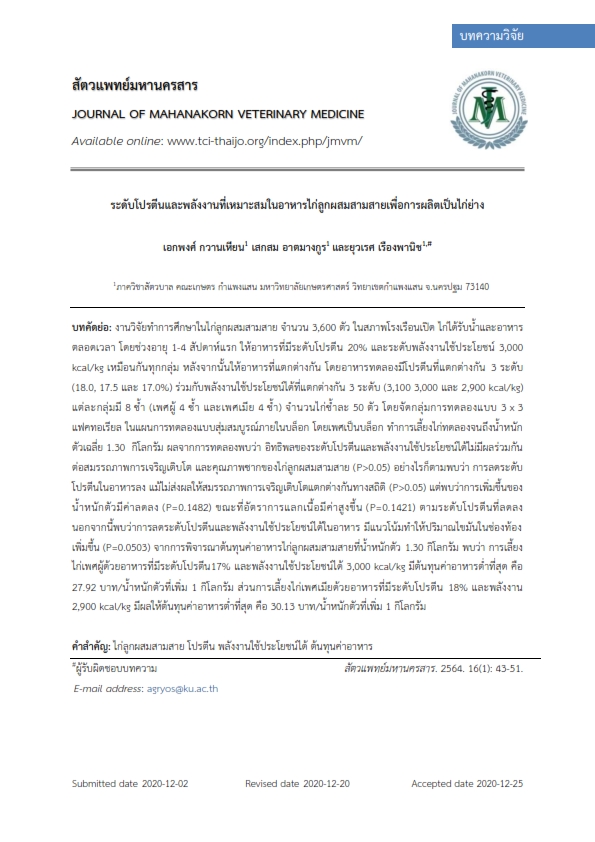Suitable Dietary Protein and Energy Levels of Three Cross Breed Chicken for Roasted Chicken Production
Main Article Content
Abstract
The study was conducted in open house using 3,600 Three cross breed chickens. Feed and water were provided ad libitum throughout the experiment. During 1-4 weeks of age, all birds were fed diets containing 20% protein and 3,000 kcal metabolizable energy/kg. Thereafter, all birds were fed diets containing 3 levels of protein (18.0, 17.5 and 17.0%) and 3 levels of metabolizable energy (3,100 3,000 and 2,900 kcal/kg) until they reached 1.30 kg average body weight. Each treatment consisted of 8 replicates (4 males and 4 females) with 50 birds per replicates. The experimental design was 3 x 3 factorial in randomized complete block design (Factorials in RCBD) with sex as block. There was no significant interaction of protein and metabolizable energy levels on growth performance and carcass quality of Three cross breed chickens (P>0.05). The reduction of protein level decreased body weight gain (P=0.1482) and increased feed conversion ratio (P=0.1421) of three cross breed chickens. In addition, % abdominal fat tended to increase with a decrease of protein and metabolizable energy (P=0.0503). The lowest feed cost per gain at 1.30 kg body weight of male three cross breed was found in birds fed diet containing 17% protein and 3,000 kcal/kg metabolizable energy (27.92 baht/kg BW). While the lowest feed cost per gain at 1.30 kg body weight of female three cross breed was found in birds fed diet containing 18% protein and 2,900 kcal/kg metabolizable energy (30.13 baht/kg BW).
Article Details

This work is licensed under a Creative Commons Attribution-NonCommercial-NoDerivatives 4.0 International License.
References
Chomchai, N., S. Namkhun, W. Sumamal, and S. Rojanastid. 1998. Effect of dietary protein and energy levels on growth performances of crossbred native chicken. Animal Nutrition Division Annual Research Report. Department of Livestock Development, Ministry of Agriculture and Cooperatives. 313.
Chomchai, N., W. Sumamal, S. Namkhun, and W. Boonpakdee. 2002. Effect of dietary protein levels on growth performances and carcass characteristics of four crossbred native chicken vs five crossbred native chicken. Animal Nutrition Division Annual Research Report. Department of Livestock Development, Ministry of Agriculture and Cooperatives. 263.
Choprakan, G., W. Suriyajantratong, O. Naksakul, P. Namdeang, and U. Senakus. 1985. A preliminary study on growth rate of native and native x rhode islandred crossbred chicken. Proceedings of 23th Kasetsart University Annual Conference. Kasetsart University, Bangkok, Thailand, 5-7 February 1985: 1-16.
Intharachote, U., R. Poonpipat, and K. Boonyanuwat. 1996. Growth and carcass quality of native chicken native. Proceedings of 34th Kasetsart University Annual Conference. Kasetsart University, Bangkok, Thailand, 30 January - 1 February 1996: 388-394.
Nguyen, T.V. and C. Bunchasak. 2005. Effect of dietary protein and energy on growth performance and carcass characteristics of Betong chicken at early growth stage. Songklanakarin J. Sci. Technol. 27(6): 1171-1178.
Nguyen, T.V., C. Bunchasak, and S. Chantsavang. 2010. Effect of dietary protein and energy on growth performance and carcass characteristics of Betong chicken (Gallus Domesticus) during growing period. Poult. Sci. 9(5): 468-472.
Odton, V. 2001. Productivity performance of parent stocks and effect of dietary protein levels and growth performance of indigenous and crossbred chickens in southern Thailand. MS Thesis, Prince of songkha University.
Pingmuang, R., S. Tangtaweewipat, B. Chevaisarakul, and B. Tananchai. 2001. Proper dietary protein and energy levels for crossbred native chicken during 6-10 weeks of age. Proceedings of 39th Kasetsart University Annual Conference. Kasetsart University, Bangkok, Thailand, 5-7 February 2001: 169-177.
Tangtaweewipat, S., B. Chevaisarakul, B. Wongrueng, and S. jaturasitha. 2001. The requirement of protein and energy levels in native hybrid chicken diets. Project research report. Department of Animal science, Faculty of Agriculture, Chiang Mai University.


